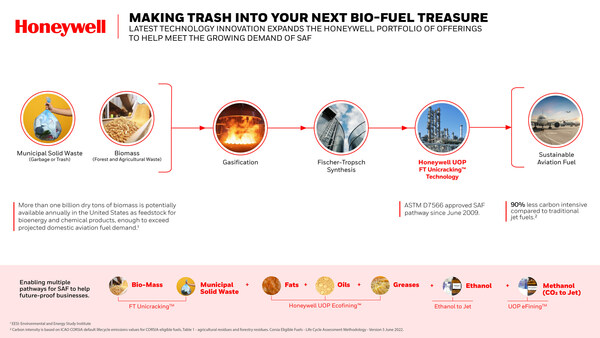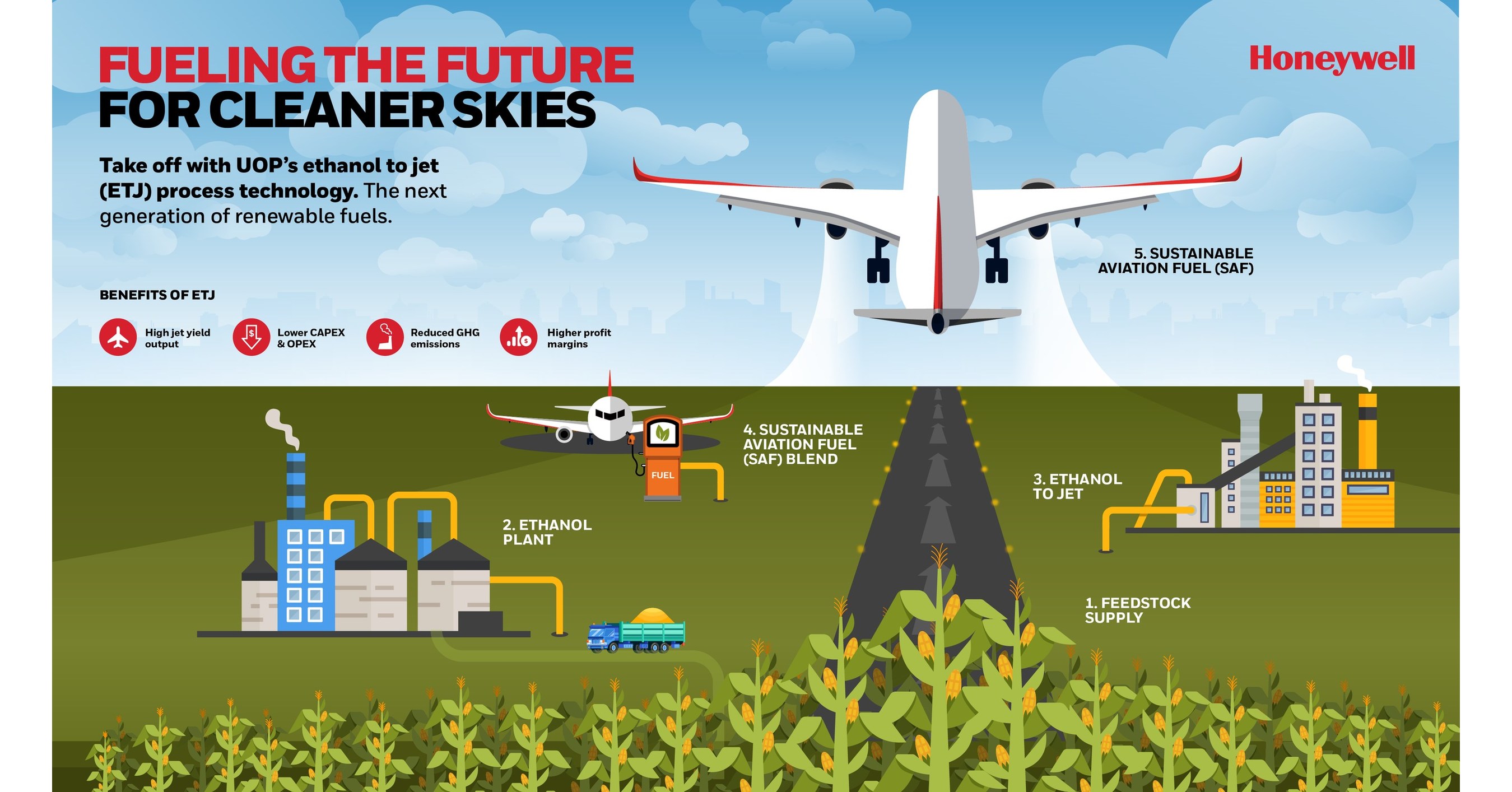
The airline sector is crucial in our interconnected world, but regular jet fuels have a big impact on greenhouse gasses. Sustainable aviation fuel (SAF) provides a cleaner option and brings hope. Honeywell leads the way with its innovative hydrocracking technology, setting the stage for a greener future in air travel.
Honeywell's Hydrocracking: A Game-Changer for SAF Production
Honeywell's breakthrough is in its advanced hydrocracking technology, particularly the Honeywell FT Unicracking™ process. This method harnesses the power of biomass, which is a sustainable source, to produce sustainable aviation fuel (SAF). Let me explain how it operates:
Unlocking Potential from Biomass: Honeywell FT Unicracking uses easily accessible biomass sources such as excess crops, wood waste, or food scraps to convert them into useful liquids and waxes. These transformed materials are then used as the foundation for sustainable aviation fuel.
Beyond Traditional Methods: Honeywell's technology expands the choices for producing sustainable aviation fuel (SAF) by using more plentiful and eco-friendly resources, setting it apart from traditional methods that depend on scarce feedstocks like vegetable oils or animal fats.
Efficiency and Cost Advantages: Honeywell FT Unicracking is highly efficient, producing 3-5% more sustainable aviation fuel (SAF) than other methods and also reducing waste streams. This leads to cost savings of up to 20%, making the production of SAF more economically feasible.

>> In Other News: Green Hydrogen Systems and BWSC Sign Strategic Collaboration Agreement on Green Hydrogen Projects
The environmental and economic benefits of Honeywell's technology are undeniable, offering a win-win solution for the aviation industry and the environment.
Soaring Towards a Greener Horizon: The Environmental Benefits of SAF
The environmental impact of SAF is profound. Here's how it revolutionizes air travel:
Reduced Carbon Footprint: Sustainable aviation fuel (SAF) has much less impact on the environment than regular jet fuels. Research shows it can reduce emissions by up to 90%, which helps a lot in reducing greenhouse gasses and fighting climate change.
Sustainable Alternative: By using renewable biomass, sustainable aviation fuel (SAF) provides an eco-friendly substitute for fossil fuels, leading to a more environmentally friendly aviation industry.
Achieving Sustainability Goals: The extensive use of sustainable aviation fuel (SAF) is crucial for the airline industry's efforts to be more sustainable. It enables airlines to actively decrease their environmental footprint and work towards achieving zero net carbon emissions in the future.

"As demand for SAF continues to grow, the aviation industry is challenged by limited supplies of traditional SAF feedstocks such as vegetable oils, animal fats and waste oils," said Ken West, president and CEO of Honeywell Energy and Sustainability Solutions. "When combined with the existing Fischer-Tropsch process, our new technology will expand the feedstock options available in the industry to sources that are more plentiful, ultimately helping improve our customers' ability to produce SAF."Honeywell: A Champion for Greener Skies
Honeywell goes beyond just creating new technology by showing their commitment to sustainability through these actions:
Leading Innovation: By introducing solutions like FT Unicracking, they demonstrate their dedication to advancing eco-friendly practices in aviation.
Decreasing Carbon Emissions: The wide use of Honeywell's technology results in significantly lower carbon emissions from aviation, encouraging a more environmentally conscious approach to flying.
Working Together for Change: They actively partner with industry allies and airlines to encourage the use of SAF, ensuring a wider positive effect on our sustainable future. With their determination and creativity, Honeywell is molding a cleaner future for air travel.
"Using Honeywell's advanced technology, DG Fuels will supply enough fuel for more than 30,000 transatlantic flights every year, contributing significantly to reducing the carbon emissions of global air travel," said Michael Darcy, CEO of DG Fuels. "This is a big leap forward in supporting the airline industry's goal of reaching net zero carbon emissions from international aviation by 2050."
>> In Company Spotlight: Honeywell International Inc
A Call to Action for a Sustainable Future
Honeywell's innovative hydrocracking technology demonstrates how innovation can positively impact the environment. By utilizing abundant biomass resources, this technology creates a path for more efficient and sustainable air travel in the future.
While Honeywell's tech is part of this solution, it's everyone in aviation committing together that will decide if this journey toward sustainability succeeds.
Subscribe to the newsletter
Daily decarbonization data and news delivered to your inbox
Follow the money flow of climate, technology, and energy investments to uncover new opportunities and jobs.
Companies
Latest issues
-
This $4.1M Deal Could Change Carbon Capture's Playbook
Inside This Issue 🗜️ CarbonQuest Lands $4.1M Alberta Deal on Gas Compressors 🛡️ CADO, 123Carbon, and Assure SAF Registry Join Forces to Tackle SAF Integrity Gaps ✈️ ISCC, OMV, and Airbus Partner t...
-
Can Koloma Crack Iowa's Billion-Year-Old Secret?
Inside This Issue ⛏️ Iowa's Hydrogen Rush: Can Koloma Strike Gold Before Rules Kick In? ✈️ Bentley Commits to Use 100% Sustainable Aviation Fuel for Car Airfreight 🌬️ Minister Parrott Provides Upd...
-
$47M Just Poured Into This SAF Producer
Inside This Issue 💰 LanzaJet Announces $47M in New Capital and First Close of Equity Round at $650M Pre-Money Valuation 🚢 Maersk's Ethanol Bet Could Reshape U.S. Fuel Markets 🪨 Canada Nickel and t...
Company Announcements
-
Feedstocks are Perennial Grasses and other Renewable Biomass Sources FREDERICK, Md., Feb. 18, 2026 /PRNewswire/ -- Do you know why passenger and freight planes are not using renewable biofuel? It'...
-
Vancouver, British Columbia--(Newsfile Corp. - February 25, 2026) - Q Precious & Battery Metals Corp. (CSE: QMET) (OTC Pink: BTKRF) (FSE: 0NB) ("QMET" or the "Company") congratulates Quebec Inn...
-
Carbon Direct and C2X Announce Collaboration on Pioneering Forestry Residue-to-Biofuel Project
Collaboration on C2X’s Beaver Lake Biofuels project advances biomass carbon removal and storage as a scalable climate solution, transforming Louisiana’s forestry and sawmill residues into biofuel a...
-
Carbon Direct and C2X Announce Collaboration on Pioneering Forestry Residue-to-Biofuel Project
Collaboration on C2X’s Beaver Lake Biofuels project advances biomass carbon removal and storage as a scalable climate solution, transforming Louisiana’s forestry and sawmill residues into biofuel a...